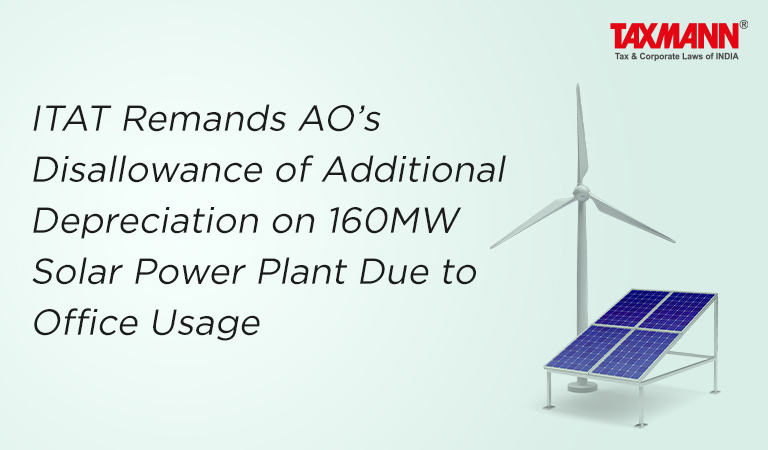ITAT Remands AO’s Disallowance of Additional Depreciation on 160MW Solar Power Plant Due to Office Usage
- Blog|News|Income Tax|
- 2 Min Read
- By Taxmann
- |
- Last Updated on 29 July, 2023

Case Details: Viney Corporation Ltd. v. ACIT - [2023] 152 taxmann.com 638 (Delhi-Trib.)
Judiciary and Counsel Details
-
- Kul Bharat, Judicial Member & M. Balaganesh, Accountant Member
- R.K. Kapoor, CA for the Appellant.
- Ms Swati Joshi, CIT DR for the Respondent.
Facts of the Case
Assessee-company had two manufacturing units/factories at ‘Bikaner’ and ‘Manesar’. During the year under consideration, two Solar Power Plants were installed at the respective factories. While furnishing the return of income assessee claimed additional depreciation on the Solar Power Plants.
During the scrutiny proceedings, the Assessing Officer allowed the claim of additional depreciation for the solar plant installed at Bikaner. With respect to the solar power plant at Manesar, AO contended that the solar plant was installed on the office rooftop, therefore, used for captive consumption in the office premises.
Accordingly, the additional depreciation claim was denied for the Manesar solar power plant, and the income was computed accordingly.
On appeal, Dispute Resolution Panel (DRP) upheld the additions made by AO, and the matter reached the Delhi Tribunal.
ITAT Held
The Tribunal held that sufficient evidence was made available by the assessee in the form of documents related to the acquisition of land, purchase of solar power plants, and installation and commissioning certificate confirming the installation and commissioning of these solar power plants.
Further, it was held that the lower authorities were not justified in treating the ‘factory premises’ as the ‘office premises’. The Solar Power Plant in question is of 160 Mega Watt capacity, and even in the wildest of imagination, it cannot be presumed to be installed for meeting the need of the office only.
Considering the fact that the Solar Power Plant is of very high capacity and it is stated at the bar that the office building is part of the factory and electricity so generated is used for the factory only, the issue was restored to AO for subsequent verification.
Disclaimer: The content/information published on the website is only for general information of the user and shall not be construed as legal advice. While the Taxmann has exercised reasonable efforts to ensure the veracity of information/content published, Taxmann shall be under no liability in any manner whatsoever for incorrect information, if any.

Taxmann Publications has a dedicated in-house Research & Editorial Team. This team consists of a team of Chartered Accountants, Company Secretaries, and Lawyers. This team works under the guidance and supervision of editor-in-chief Mr Rakesh Bhargava.
The Research and Editorial Team is responsible for developing reliable and accurate content for the readers. The team follows the six-sigma approach to achieve the benchmark of zero error in its publications and research platforms. The team ensures that the following publication guidelines are thoroughly followed while developing the content:
- The statutory material is obtained only from the authorized and reliable sources
- All the latest developments in the judicial and legislative fields are covered
- Prepare the analytical write-ups on current, controversial, and important issues to help the readers to understand the concept and its implications
- Every content published by Taxmann is complete, accurate and lucid
- All evidence-based statements are supported with proper reference to Section, Circular No., Notification No. or citations
- The golden rules of grammar, style and consistency are thoroughly followed
- Font and size that’s easy to read and remain consistent across all imprint and digital publications are applied



 CA | CS | CMA
CA | CS | CMA
